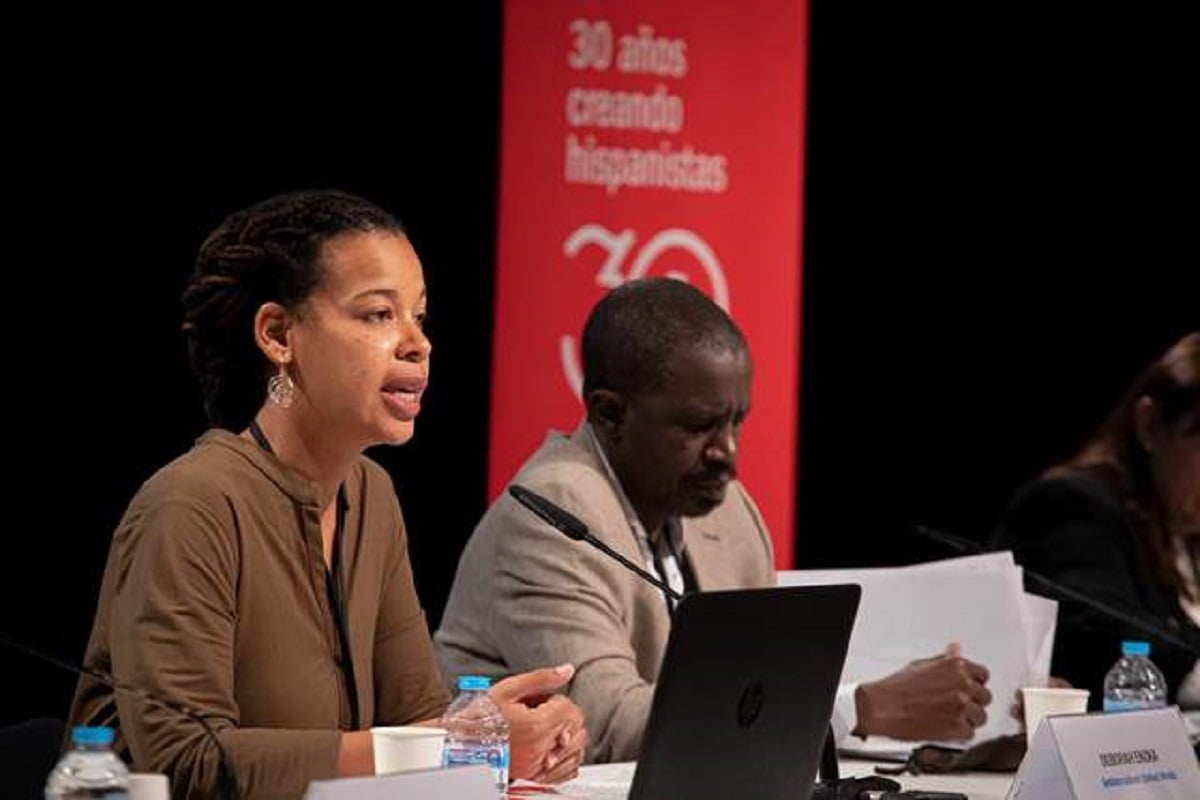Mediterranean Dialogue
The " 2nd Meeting of Hispanists Africa-Spain" consolidates the importance of "Afro-Hispanism"

The Cervantes Institute is holding the 2nd Africa-Spain Hispanists' Meeting " The African imprint on Spanish", a forum for dialogue that will be held in Madrid from Tuesday until Thursday 18 November, to reflect on the African imprint on Spanish, especially in Hispanic literature and cultures. The Secretary of State for Foreign and Global Affairs, Ángeles Moreno Bau, the Secretary General of the Cervantes Institute, Carmen Noguero, and the Director of Casa África, José Segura Clavell, opened this conference, which can be followed online.
Ángeles Moreno Bau welcomed "the many Hispanists who are following us today through the networks" and thanked the holding of this meeting which "increases ties with the African continent", from which she recalled that 7% of all students of Spanish in the world come from, a continent in which "we continue to work to weave more agreements so that Spanish is studied".
The Secretary of State contemplated the possibility of a future Third Meeting being held in an African country as a "sign of encounter and harmony" and stated "the undoubted role of the Government in strengthening ties" but acknowledged "the essential role of civil society, such as teachers, Hispanists and workers".
Casa África's director, José Segura Clavell, considered that this event "culminates a commitment made two years ago and represents the starting point of a long series of meetings", thus highlighting the continuity of the first edition held in 2019 in Las Palmas de Gran Canaria.
Casa África's director highlighted the addition of "the entire structure of the Ministry of Foreign Affairs and the Spanish International Agency for International Development Cooperation" to the organisation of this project as it allows "synergies and actions to be added with the aim of making resources profitable" and developing "collaboration agreements in African countries so that their education systems include the teaching of Spanish".
Carmen Noguero, for her part, expressed "the need to give visibility to another Hispanic culture, Afro-Hispanic", which was one of the conclusions drawn at the first meeting. For this reason, "we wanted to address and highlight the African imprint on Spanish, that is to say, everything in Spanish and culture in Spanish that is African, everything that has influenced and been mixed in Hispanic cultures, especially in Latin America, coming from Africa".
Extensive programme of sessions over three days
Literature took centre stage today with the lectures "The traces of African culture in literature in Spanish", by Ndioro Sow, director of the Department of Spanish Language and Hispanic Civilisations at the Gastón Berger University, and "The writing of the African diaspora", with Barbara Fraticelli, director of the African Voices Research Group at the Complutense University of Madrid, which was followed by a colloquium.
The literature of Equatorial Guinea, the only Spanish-speaking African country with its own literary creation in Spanish, will play an important role tomorrow, Tuesday, with the conference "Equatoguinean literature in Spanish", given by the Equatoguinean writer and journalist Donato Ndongo, followed by a colloquium. The lecture and subsequent colloquium, "Women in African narrative", by Maimouna Sankhé, coordinator of the Spanish Section of the Department of Modern Languages at the University of Ghana, will deal with the role of women in African narrative in Spanish.
On Thursday, a conference and subsequent colloquium will deal with "The teaching of Spanish in sub-Saharan Africa", a region that "is growing in students at the same rate as its population", said Carmen Noguero. The sub-Saharan region currently has more than 1,840,000 students of Spanish, in a total of 26 countries. Of these, the countries with the largest number of students are Ivory Coast, with 566,178 students, Benin, with 412,515 students, and Senegal with 356,000.
The meeting will end on Thursday 17th November with the presentation "Institutional actions and plans in Sub-Saharan Africa", by the academic director of the Cervantes Institute, Carmen Pastor Villalba; the head of Casa África's Culture Department, Juan Jaime Martínez; the Deputy Director General of Multilateral and Horizontal Affairs of the MAUC's Directorate General for Africa, Tomás López Vilariño; the Deputy Head of the AECID's Department of Cooperation and Cultural Promotion, Araceli Sánchez Garrido; and the Coordinator of the Scientific and Research Area of the Women for Africa Foundation, Anna Fumarola.
The Minister of Foreign Affairs, European Union and Cooperation, José Manuel Albares, will close the 'II Encuentro de Hispanistas África-España' with a video address at 13:00.
Organised by the Cervantes Institute, Casa África, the Spanish International Agency for International Development Cooperation (AECID) and the Ministry of Foreign Affairs, European Union and Cooperation (MAUC), and with the collaboration of the Women for Africa Foundation, it can be followed live on the Cervantes Institute's YouTube channel.
Spanish on the African continent
According to data updated to 10 November 2021, Spanish is studied in 32 countries on the African continent, with a total number of students of Spanish as a foreign language of 2,024,164. Of these, 1,847,870 are students in Sub-Saharan African countries, in a total of 26 countries in the region.
In Equatorial Guinea, 906,779 people belong to the group of native speakers of Spanish, 318,598 people are part of the group of limited proficiency in the language, and 128,895 students of Spanish make up the group of learners of the language.
In the African university environment, Spanish is present in 68 Spanish departments in 33 African countries.
The Instituto Cervantes is present in 21 cities on the African continent, in the following 6 countries: Algeria (3 cities), Egypt (2 cities), Morocco (13 cities), Tunisia (1 city), Senegal (1 city) and Ivory Coast (1 city).
